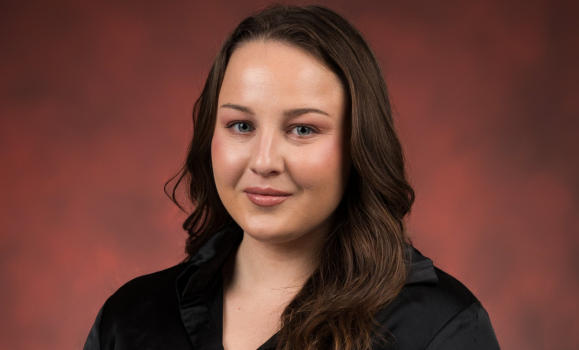Meet postdoctoral fellow, Dr. Rachelle Aucoin

Dr. Rachelle Aucoin is a Postdoctoral Fellow in the Department of Community Health and Epidemiology at Dalhousie University, working with Dr. Sanja Stanojevic. With a background in respiratory physiology and exercise science, Dr. Aucoin brings a multidisciplinary approach to research, focusing on improving respiratory health outcomes and advancing public health through innovative methodologies.
Q: Can you describe your academic journey and what led you to research in community health and epidemiology?
My academic pathway began with a Bachelor of Kinesiology (Honours) at Acadia University (2019), followed by a PhD in Kinesiology Sciences (Clinical Exercise and Respiratory Physiology) at McGill University (2025). Training in symptom assessment, cardiopulmonary exercise testing, lung function measurement, and clinical trial design led me to research questions at the intersection of physiology, epidemiology, and public health.
Q: What are your primary research interests and how do you approach them?
I focus on the management and measurement of respiratory health outcomes across the lifespan, especially in adults with chronic lung disease. My interests include understanding and managing respiratory symptoms (like breathlessness), integrating cardiorespiratory physiology with advanced epidemiological methods, and improving therapeutic management using novel physiological standards. I also study the lung health effects of novel tobacco and nicotine products in youths and young adults. My work uses multi-method approaches, including clinical trials and large population-based cohorts.
Q: What are some of your most significant research contributions and recognitions?
I’ve been recognized nationally and internationally, including as an Emerging Dyspnea Scientist at the 2024 Dyspnea Society Meeting, and received best oral presentation awards at the Dyspnea Society Meeting (Oxford, 2022 & Montreal, 2024). I’ve earned competitive graduate fellowships from the Canadian Institute of Health Research (CIHR), Fonds de Recherche de Quebec Sante (FRQS), Canadian Respiratory Research Network (CRRN), Quebec Respiratory Research Health Network (QRHN), and David L. Montgomery Award in Exercise Physiology (McGill University). My publications include pioneering work on trigeminal nerve stimulation for breathlessness relief, published in Respiratory Physiology and Neurobiology, and the largest randomized controlled trial to date on fan-to-face therapy for chronic lung disease, recently published in the European Respiratory Journal.
Q: How do you ensure your research reaches stakeholders and supports public health?
I collaborate closely with clinicians and multidisciplinary health professionals to ensure knowledge translation throughout my research. Since joining Dalhousie, I’ve worked with community partners like Lung NS PEI, the Canadian Cancer Society, the Department of Health and Wellness, and the Canadian Research Initiative in Substance Matters.
Q: Can you share your experience with mentorship and fostering inclusive research environments?
Mentorship from Dr. Dennis Jensen (McGill) and Dr. Sanja Stanojevic (Dalhousie) has shaped my career, emphasizing rigorous analysis and innovation. From both, I have learned the value of rigorous analytical thinking when approaching complex research questions, and the importance of innovation in developing solutions that advance the field. Through my own mentorship, I’ve supervised undergraduate and graduate students, aiming to pass on these values. As Chair for the Scientific & Health Data Assets in Respiratory Research (shAIRe) Rising Stars network, I support the next generation of respiratory health researchers across Canada through training and national project coordination.
Q: What are your long-term research goals and their potential impact?
My long-term goal is to develop practical tools and models for assessing symptoms and lung function that can be used not only in research centers, but also in primary care and community settings. By combining clinical research with large population datasets, I aim to help identify people at risk for poor respiratory outcomes earlier and improve access to effective interventions for chronic lung disease.
This work is especially relevant in the Maritimes, where many communities have limited access to specialized care. By creating simple and scalable approaches, I hope to support clinicians in making better triage decisions and allocating resources more efficiently. Ultimately, my research can inform health policies and guidelines, helping to improve respiratory health outcomes both locally and across Canada.
